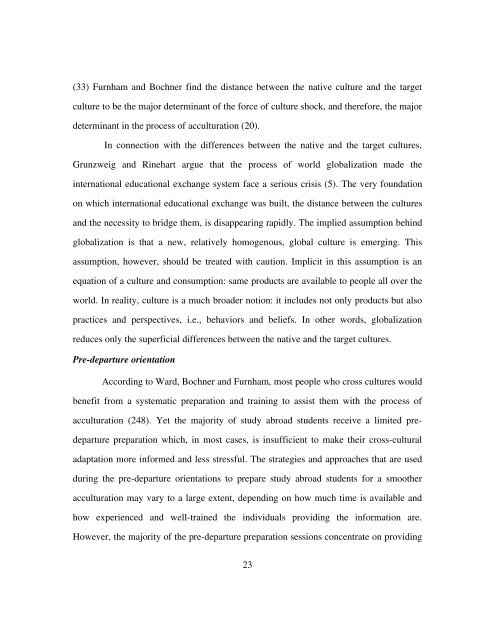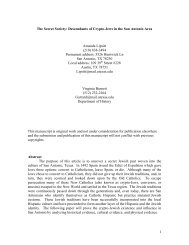Copyright by Tatiana Borisovna Segura 2008 - The University of ...
Copyright by Tatiana Borisovna Segura 2008 - The University of ...
Copyright by Tatiana Borisovna Segura 2008 - The University of ...
Create successful ePaper yourself
Turn your PDF publications into a flip-book with our unique Google optimized e-Paper software.
(33) Furnham and Bochner find the distance between the native culture and the target<br />
culture to be the major determinant <strong>of</strong> the force <strong>of</strong> culture shock, and therefore, the major<br />
determinant in the process <strong>of</strong> acculturation (20).<br />
In connection with the differences between the native and the target cultures,<br />
Grunzweig and Rinehart argue that the process <strong>of</strong> world globalization made the<br />
international educational exchange system face a serious crisis (5). <strong>The</strong> very foundation<br />
on which international educational exchange was built, the distance between the cultures<br />
and the necessity to bridge them, is disappearing rapidly. <strong>The</strong> implied assumption behind<br />
globalization is that a new, relatively homogenous, global culture is emerging. This<br />
assumption, however, should be treated with caution. Implicit in this assumption is an<br />
equation <strong>of</strong> a culture and consumption: same products are available to people all over the<br />
world. In reality, culture is a much broader notion: it includes not only products but also<br />
practices and perspectives, i.e., behaviors and beliefs. In other words, globalization<br />
reduces only the superficial differences between the native and the target cultures.<br />
Pre-departure orientation<br />
According to Ward, Bochner and Furnham, most people who cross cultures would<br />
benefit from a systematic preparation and training to assist them with the process <strong>of</strong><br />
acculturation (248). Yet the majority <strong>of</strong> study abroad students receive a limited pre-<br />
departure preparation which, in most cases, is insufficient to make their cross-cultural<br />
adaptation more informed and less stressful. <strong>The</strong> strategies and approaches that are used<br />
during the pre-departure orientations to prepare study abroad students for a smoother<br />
acculturation may vary to a large extent, depending on how much time is available and<br />
how experienced and well-trained the individuals providing the information are.<br />
However, the majority <strong>of</strong> the pre-departure preparation sessions concentrate on providing<br />
23

















